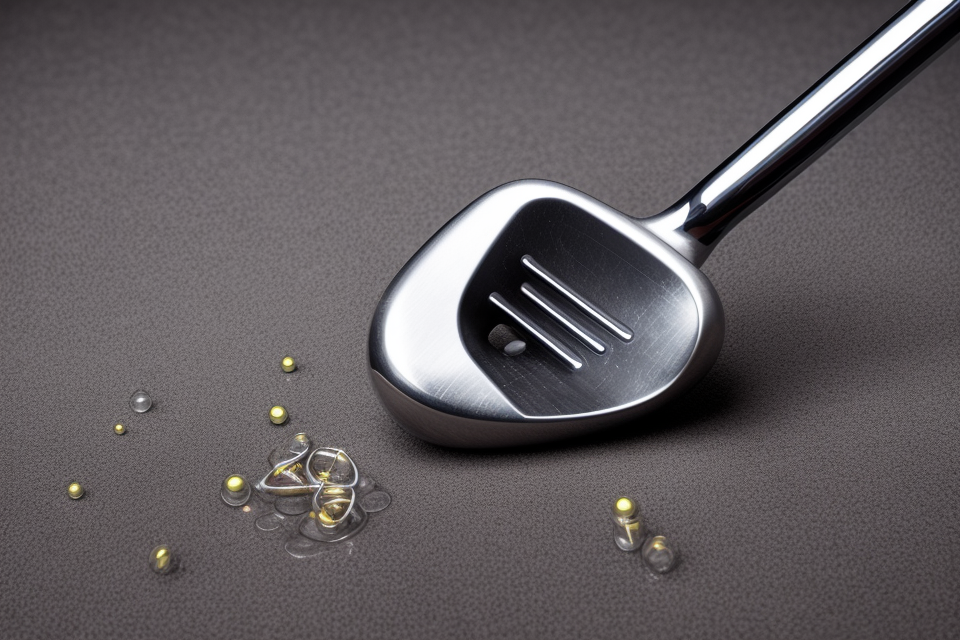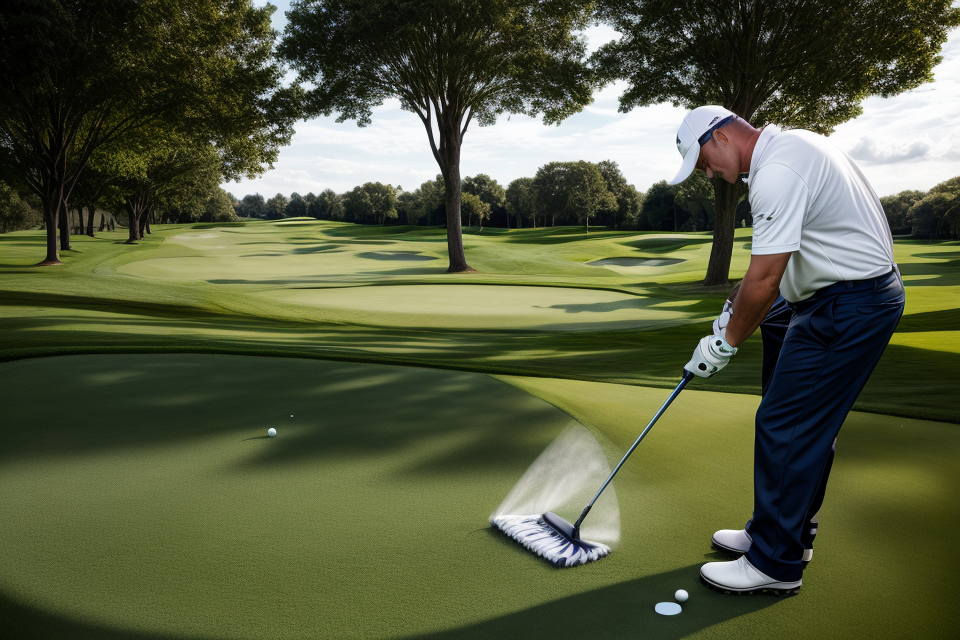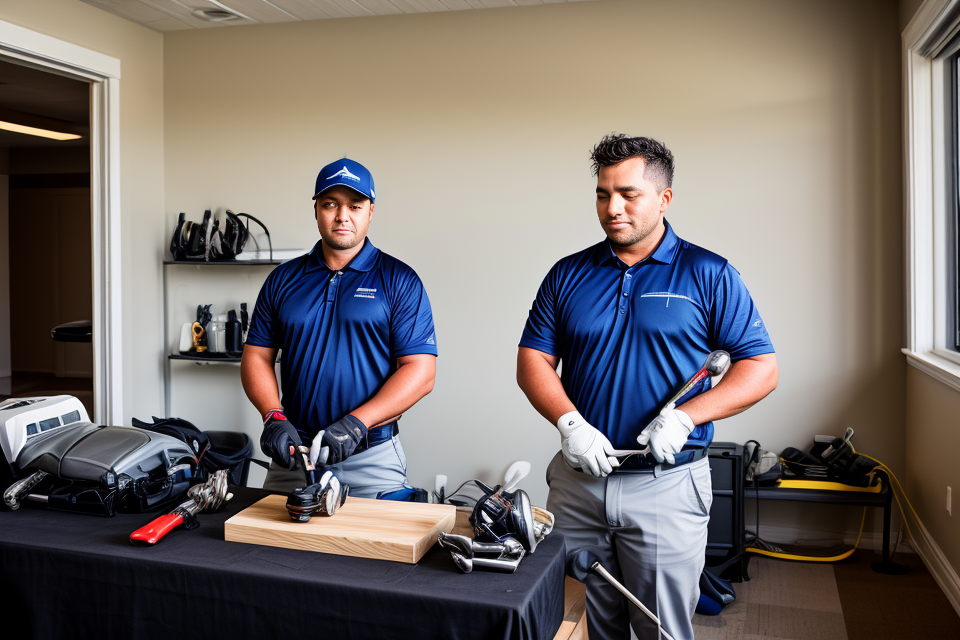
Golf is a game that requires precision and accuracy, and having the right equipment is crucial to success. One question that many golfers ask is whether WD-40 can help keep their golf clubs in top condition. WD-40 is a versatile lubricant and cleaning solution that is used in a variety of applications, from bicycles to machinery. But can it be used to clean and maintain golf clubs? In this article, we will explore the answer to this question and determine whether WD-40 is an effective solution for golf club maintenance. So, grab your golf clubs and let’s get started!
WD-40 can be used to protect and maintain the condition of golf clubs by providing a barrier against rust and corrosion. However, it is important to note that WD-40 is not a replacement for regular cleaning and maintenance of golf clubs. Golf clubs should be cleaned and inspected after each use, and any damaged or worn components should be replaced. In addition, using WD-40 on golf clubs may affect the grip and feel of the club, so it should be used sparingly and only in areas where it is needed. Overall, while WD-40 can be a helpful tool in maintaining the condition of golf clubs, it should be used in conjunction with regular cleaning and maintenance, and not as a substitute.
The Myth of Using WD-40 for Golf Club Maintenance
The Misconception
While WD-40 is known for its ability to protect and lubricate a wide range of surfaces, it is not an effective solution for maintaining golf clubs. This is because golf clubs are exposed to various environmental conditions that can cause corrosion and wear, and WD-40 is not specifically designed to address these issues.
In fact, using WD-40 on golf clubs can actually have negative effects. The oil can attract dirt and debris, which can accumulate in the grooves and ridges of the clubhead, affecting its performance. Additionally, WD-40 can make the grips slippery, which can lead to a loss of control during swings.
Despite these drawbacks, some golfers may still be tempted to use WD-40 as a quick and easy solution for maintaining their clubs. However, it is important to understand that proper maintenance requires specific techniques and products designed for the unique needs of golf clubs.
It is also worth noting that many professional golfers and golf equipment manufacturers do not recommend using WD-40 on golf clubs. Instead, they suggest using specialized cleaners and lubricants that are designed to protect and enhance the performance of golf clubs.
The Reality
Although WD-40 is known for its ability to protect and lubricate machinery, it is not an effective solution for maintaining golf clubs. Golf clubs are exposed to various environmental conditions, such as humidity, dust, and dirt, which can cause rusting and corrosion. As a result, it is crucial to use the right products to clean and protect the clubs.
Using WD-40 on golf clubs can actually have a negative impact on their performance. The oil in WD-40 can make the grips slippery, affecting the golfer’s control over the club. Moreover, the oil can build up on the club’s surface, creating a layer that attracts dirt and other debris, which can lead to increased friction and reduced performance.
Additionally, WD-40 is not designed to penetrate and remove the grease and grime that accumulate on golf clubs, making it an ineffective cleaner. The right cleaning products for golf clubs are specifically formulated to dissolve and remove the built-up dirt, grease, and oil, ensuring that the clubs remain in top condition.
Therefore, while WD-40 may be useful for maintaining other equipment, it is not recommended for golf club maintenance. Golfers should use specialized cleaning products and lubricants designed specifically for golf clubs to keep them in optimal condition.
Is It Safe to Use WD-40 on Golf Clubs?
Many golfers swear by WD-40 as a miracle product for maintaining their golf clubs. It’s often recommended as a way to keep clubs clean and prevent rusting. However, the question remains: is it safe to use WD-40 on golf clubs?
First, it’s important to understand what WD-40 is. WD-40 is a penetrating oil and solvent that was originally designed to protect against rust and corrosion on machines. It’s made up of various chemicals, including hydrocarbons, silicone, and other solvents.
While WD-40 may be effective at cleaning and protecting machines, it’s not necessarily safe for use on golf clubs. Golf clubs are made of metal, and while WD-40 may not damage the metal itself, it can damage the coatings and finishes on the clubs. Additionally, WD-40 can leave a residue that can attract dirt and other debris, which can actually damage the clubs over time.
Another potential issue with using WD-40 on golf clubs is that it can make it difficult to grip the clubs properly. WD-40 can make your hands slippery, which can be dangerous when swinging a golf club.
So, while WD-40 may seem like a convenient and effective solution for maintaining your golf clubs, it’s not necessarily safe to use it on them. Instead, it’s best to use specialized golf club maintenance products that are specifically designed to protect and maintain the clubs.
Alternatives to WD-40 for Golf Club Maintenance
Overview of Alternative Products
When it comes to maintaining golf clubs, there are a variety of products that can be used as alternatives to WD-40. Here is an overview of some of the most popular options:
Silicone-Based Lubricants
Silicone-based lubricants are a popular alternative to WD-40 for golf club maintenance. These lubricants are designed to provide a long-lasting, dry film that protects against rust and corrosion. They are also resistant to high temperatures, making them ideal for use in high-heat environments.
Teflon-Based Lubricants
Teflon-based lubricants are another popular alternative to WD-40. These lubricants are known for their low viscosity, which allows them to penetrate deep into the moving parts of golf clubs. They also provide excellent protection against rust and corrosion, making them a great choice for maintaining golf clubs.
Synthetic Oils
Synthetic oils are a versatile option for golf club maintenance. They are designed to provide lubrication and protection against rust and corrosion, while also reducing friction and wear on moving parts. Synthetic oils are also resistant to high temperatures, making them a great choice for use in high-heat environments.
Graphite Sprays
Graphite sprays are a popular option for maintaining the club head of golf clubs. They are designed to reduce friction and improve the overall performance of the club head. Graphite sprays are also resistant to high temperatures, making them a great choice for use in high-heat environments.
Overall, there are many alternatives to WD-40 for golf club maintenance. When choosing a product, it’s important to consider the specific needs of your golf clubs and choose a product that provides the necessary lubrication, protection against rust and corrosion, and performance enhancement.
Comparison of WD-40 and Alternative Products
While WD-40 is a popular choice for maintaining golf clubs, there are alternative products available that may provide better results. Here is a comparison of WD-40 and some of its alternative products for golf club maintenance.
WD-40
- Penetrates and loosens rust and grime
- Lubricates moving parts
- Protects against rust and corrosion
- Non-toxic and non-flammable
- Affordable and widely available
Alternative Products
- Silicone-based lubricants: These lubricants are specifically designed for use with golf clubs and provide better lubrication and protection against rust and corrosion than WD-40. They are also non-toxic and non-flammable.
- Teflon-based lubricants: These lubricants are known for their ability to withstand extreme temperatures and provide excellent protection against rust and corrosion. They also provide better lubrication than WD-40 and are non-toxic and non-flammable.
- Graphite lubricants: These lubricants are specifically designed for use with golf clubs and provide excellent lubrication and protection against rust and corrosion. They are also non-toxic and non-flammable.
Overall, while WD-40 is a popular choice for maintaining golf clubs, alternative products may provide better results. It is important to consider the specific needs of your golf clubs and choose a product that will provide the best protection and performance.
How to Choose the Right Product for Your Golf Clubs
Choosing the right product for maintaining your golf clubs is crucial to ensure they remain in top condition. Here are some factors to consider when selecting a product:
- Compatibility: Ensure the product is compatible with the materials used to make your golf clubs. Some products may damage certain materials, so it’s essential to choose one that won’t cause any harm.
- Functionality: The product should serve the purpose of maintenance, whether it’s cleaning, lubricating, or protecting your golf clubs. Make sure the product performs the specific task you need it to do.
- Safety: Choose a product that is safe to use on your golf clubs and won’t cause any harm to you or the environment.
- Ease of Use: The product should be easy to use and apply to your golf clubs. It should also be easy to remove if necessary.
- Cost: Consider the cost of the product and whether it’s within your budget. While expensive products may offer better results, there are also more affordable options that can work just as well.
- Reputation: Look for products with a good reputation among golfers and experts. This can give you an idea of the product’s quality and effectiveness.
By considering these factors, you can choose the right product for maintaining your golf clubs and ensure they remain in top condition.
Best Practices for Maintaining Golf Clubs
Cleaning Your Golf Clubs
Maintaining your golf clubs is essential to ensure that they remain in top condition and perform optimally. Cleaning your golf clubs is one of the most critical aspects of maintenance, as it helps to remove dirt, debris, and other contaminants that can affect the club’s performance.
Here are some best practices for cleaning your golf clubs:
- Use a soft, dry cloth to wipe down the clubhead, shaft, and grip after each use. This will help to remove any loose dirt or debris that may be present.
- For more stubborn dirt and grime, use a soft-bristled brush to gently scrub the clubhead and shaft. Be sure to avoid brushing too hard, as this can damage the club’s finish.
- If the club has a removable grip, use a grip wrench to remove it. Then, use a grip cleaner and a soft cloth to wipe down the grip and remove any dirt or grime.
- For clubs with removable heads, use a head cleaner and a soft cloth to wipe down the clubhead. This will help to remove any dirt or grime that may be present on the clubhead’s surface.
- Avoid using harsh chemicals or abrasive cleaners, as these can damage the club’s finish and compromise its performance.
- Once the club is clean, use a soft cloth to wipe down the club and remove any excess moisture. This will help to prevent rust and corrosion from forming on the club.
By following these best practices for cleaning your golf clubs, you can help to ensure that they remain in top condition and perform optimally on the course.
Lubricating Your Golf Clubs
Maintaining your golf clubs in top condition is essential for improving your game. One of the best practices for doing so is by regularly lubricating your golf clubs. Here’s why:
Reasons to Lubricate Your Golf Clubs
- Reduces Friction: Lubricating your golf clubs can help reduce friction between the moving parts, which can help prevent wear and tear on the club.
- Improves Performance: By reducing friction, lubricating your golf clubs can help improve the overall performance of the club. This is because the club will be able to move more smoothly, which can lead to more accurate shots.
- Prolongs Club Life: Regular lubrication can help prolong the life of your golf clubs by reducing wear and tear on the moving parts. This can help you get more use out of your clubs before needing to replace them.
How to Lubricate Your Golf Clubs
- Clean the Club: Before lubricating your golf club, it’s important to clean it thoroughly. This will remove any dirt or debris that may be obstructing the moving parts.
- Apply Lubricant: Once the club is clean, apply a lubricant such as WD-40 to the moving parts. Be sure to apply it evenly and in a way that will not interfere with the club’s performance.
- Test the Club: After applying the lubricant, test the club to ensure that it’s moving smoothly and that the lubricant has not affected its performance.
Frequency of Lubrication
It’s recommended to lubricate your golf clubs at least once a month, or more frequently if you play regularly. This will help keep your clubs in top condition and ensure that they’re performing at their best.
By following these best practices for lubricating your golf clubs, you can help improve your game and prolong the life of your clubs. So, the next time you’re on the course, be sure to bring some lubricant and take a few minutes to maintain your clubs.
Storing Your Golf Clubs
Proper storage of golf clubs is essential to maintain their condition and extend their lifespan. Here are some best practices for storing your golf clubs:
- Clean and Dry Clubs Before Storage: Before storing your golf clubs, make sure they are clean and dry. Any dirt or moisture can lead to corrosion and damage to the clubs.
- Use a Club Bag: Golf clubs are designed to be stored in a bag, which helps protect them from scratches and other types of damage. If you don’t have a dedicated club bag, you can use a soft case or a golf towel to protect your clubs.
- Store Clubs in a Dry Place: Store your golf clubs in a dry place, away from direct sunlight and moisture. This will help prevent rust and corrosion from forming on the clubs.
- Keep Clubs Away from Heat Sources: Avoid storing your golf clubs near heat sources, such as radiators or space heaters, as this can cause the clubs to warp or become damaged.
- Check Clubs for Damage: Before storing your golf clubs, inspect them for any damage, such as bent or broken shafts, or loose or damaged grips. If you notice any damage, repair it before storing the clubs.
By following these best practices for storing your golf clubs, you can help ensure that they remain in top condition and are ready for your next round of golf.
Tips for Maintaining Golf Clubs
Keep Your Clubs Clean
Regular cleaning is essential for maintaining the performance and longevity of your golf clubs. Use a soft, damp cloth to wipe down your clubs after each use, paying special attention to the grip and any moving parts.
Inspect Your Clubs Regularly
Inspect your golf clubs regularly for any signs of wear or damage. Look for cracks, rust, or other signs of wear on the clubhead, shaft, and grip. Replace any damaged clubs promptly to ensure they continue to perform optimally.
Store Your Clubs Properly
Proper storage is crucial for protecting your golf clubs from damage. When not in use, store your clubs in a dry, cool place, away from direct sunlight and extreme temperatures. Consider investing in a golf club bag or case to protect your clubs during transport.
Use WD-40 to Protect Your Clubs
While WD-40 can help protect your golf clubs from rust and corrosion, it should not be used as a replacement for regular cleaning and maintenance. Use WD-40 sparingly and only on moving parts, such as hinges and screws, to protect against rust and corrosion.
Maintain the Right Tension in Your Grip
A proper grip is essential for control and accuracy when swinging. Make sure to maintain the right tension in your grip, neither too tight nor too loose. A comfortable grip that allows for smooth movements is key to a successful swing.
Sharpen Your Clubs Regularly
Regularly sharpening the cutting edge of your irons can improve your swing and help you achieve better accuracy and distance. Consider having your clubs professionally sharpened or sharpen them yourself using a sharpening stone or guide.
By following these tips for maintaining your golf clubs, you can ensure they remain in top condition and continue to perform optimally, round after round.
Recap of Key Points
When it comes to maintaining golf clubs, there are several key points to keep in mind. These include:
- Cleaning your clubs regularly: Dirt and debris can accumulate on your clubs over time, which can affect their performance. It’s important to clean your clubs regularly to ensure they are functioning properly.
- Inspecting your clubs for damage: Before each use, inspect your clubs for any signs of damage, such as bent or broken shafts, worn grips, or loose clubheads. Any damage should be addressed immediately to prevent further deterioration.
- Storage: When not in use, store your clubs in a dry, cool place, away from direct sunlight. This will help prevent damage to the clubs and extend their lifespan.
- Regular tune-ups: Over time, your clubs may require tuning to maintain optimal performance. Regular tune-ups can help ensure that your clubs are performing at their best.
- Using the right equipment: Make sure you are using the right equipment for your skill level and playing conditions. Using the wrong equipment can negatively impact your performance and even cause injury.
By following these best practices, you can help keep your golf clubs in top condition and ensure that they are performing at their best.
Final Thoughts on Using WD-40 for Golf Club Maintenance
- When it comes to maintaining your golf clubs, it’s important to follow best practices. This includes regularly cleaning and inspecting your clubs, storing them properly when not in use, and ensuring that they are in good working condition.
- When it comes to using WD-40 as a maintenance tool, it’s important to keep in mind that it can be effective in protecting against rust and corrosion. However, it’s important to use it sparingly and in the right areas, as it can also attract dirt and debris and potentially cause damage to certain materials.
- Ultimately, the decision to use WD-40 on your golf clubs should be based on your personal preference and the specific needs of your clubs. If you’re unsure about whether or not to use it, it’s always a good idea to consult with a professional golf club repair expert for advice.
- In summary, while WD-40 can be a useful tool for maintaining your golf clubs, it’s important to use it appropriately and in conjunction with other maintenance practices. By following these guidelines and taking good care of your clubs, you can help ensure that they remain in top condition for years to come.
FAQs
1. What is WD-40?
WD-40 is a penetrating oil and water-displacing spray that is used to protect metal from rust and corrosion. It is often used to lubricate machinery and tools, and is also used to clean and protect a variety of surfaces.
2. Can WD-40 be used to clean golf clubs?
WD-40 can be used to clean golf clubs, but it is not specifically designed for this purpose. While it may remove dirt and grime from the clubs, it may also leave a residue that can attract more dirt and debris. There are specifically designed cleaning solutions for golf clubs that will do a better job of cleaning and protecting your equipment.
3. Will WD-40 damage my golf clubs?
WD-40 is safe to use on most golf club materials, including metal and plastic. However, it is important to avoid getting WD-40 on the grips or any other surfaces where it may cause damage. Additionally, using WD-40 excessively or repeatedly may cause buildup and residue on the clubs, which can negatively affect their performance.
4. Is WD-40 an effective way to protect my golf clubs from rust and corrosion?
WD-40 can help protect your golf clubs from rust and corrosion, but it is not the most effective solution. There are specifically designed rust prevention and corrosion inhibitors that are better suited for protecting your golf clubs. Using WD-40 sparingly and in addition to these protective solutions can provide added protection.
5. Are there any alternative cleaning solutions for golf clubs?
Yes, there are specifically designed cleaning solutions for golf clubs that are designed to effectively clean and protect your equipment. These solutions are specifically formulated to remove dirt, grime, and other contaminants from the clubs without leaving a residue or damaging the materials. It is recommended to use these solutions instead of WD-40 for cleaning your golf clubs.


